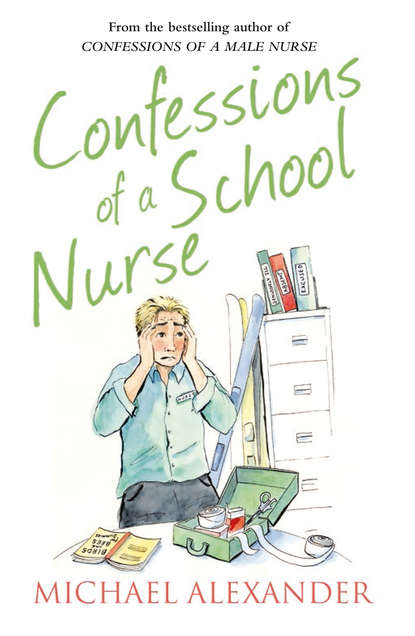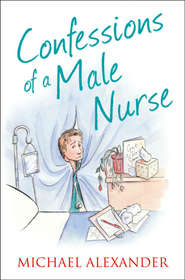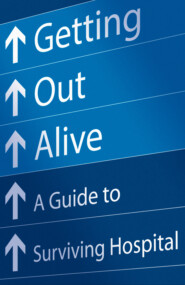По всем вопросам обращайтесь на: info@litportal.ru
(©) 2003-2024.
✖
Confessions of a School Nurse
Настройки чтения
Размер шрифта
Высота строк
Поля
One moment I can be reprimanding a kid for bad behaviour, the next I’m consoling a child whose grandfather has just died. Before starting this job I had reasoned that my role would be varied and that I would end up doing things outside my job description. What I was not prepared for was to constantly be playing detective.
In a hospital setting, you tend to believe what the patient tells you. This makes sense as most people don’t like waiting hours to be seen for no reason. But everything’s different in a school, where students are looking for excuses to get out of class or homework.
To avoid being taken advantage of, I began to develop some unique (patent pending) assessment techniques.
‘Sir, I’ve got a sore throat’ was one of the most common complaints. After a quick peek at their throat I could usually tell if they were exaggerating, or outright lying. If it looked OK and they had no fever, I would send them to class with some lozenges and paracetamol. This was never the desired result, and within my second week on the job, the children had become resilient to my tactics.
‘I vomited during the night, and my throat is sore,’ said Marie, the very same Marie who had burst into tears only a week earlier with a blocked nose. Marie had not kept her promise about staying away, she had already become a regular.
Every year there are a dozen or so regulars who stop by two or three times a week, and the reasons vary. They may be homesick, or it may be their first time being unwell without their mother around. Often this changes once they make friends or figure out where they fit in. Sometimes all they need is a wave, a smile, a nod of the head that says ‘I’m here for you’ and ‘you belong’.
The problem with Marie was that she looked in fantastic health. Sure, she could have been up all night vomiting, and one symptom of a bad sore throat (strep throat) is actually an upset stomach so her history does need to be taken seriously as there are potential complications. However, while this is plausible, generally if the throat looks fine, and they have no fever, then I’m stuck with a healthy looking student, with a normal looking throat, who simply claims they’ve been up most of the night vomiting.
‘Your throat is probably sore because of so much vomiting,’ I tentatively suggested, ‘and your throat actually looks fine, you’re not pale, and your tummy doesn’t seem to be making too much noise …’ My voice trailed off as Marie looked ready to shed some tears, but I completed the ritual: 750mg paracetamol (based on her weight), throat lozenges, honey and camomile tea, and a late pass to class.
‘Can’t I rest, for just one class?’ she asked, but her heart was no longer in it. She had won a partial victory with a late pass, my kindness and a detailed explanation of what my examination had found – nothing – and she relented and left, although I did offer her a vomit bowl on the way out, telling her to ‘come back if you fill it up’.
When they don’t get the reaction they want, occasionally a student’s mouth drops open, they pull out their iPhones and dial their parents. Others just head to class. Fortunately, this relationship had moved on from that first teary-eyed encounter, and Marie and I had come to an unacknowledged yet mutual understanding, where she got the full works – medicines, honeyed tea and a late pass – and did not cry or insist on resting in bed. She took the bowl with a sheepish smile. She was ‘well enough’ to appreciate my wry stab at humour.
I’m usually vindicated by lunch break when I see the kids who were supposedly up all night vomiting disregarding my advice about avoiding fried/heavy food, eating fries and hamburgers at lunchtime with no obvious ill effects.
Of course, I did get it wrong sometimes, and continue to do so even now from time to time, but I was adapting. I’d sussed the kids out – who were the ones to keep an eye on – and in turn they were beginning to work me out too.
Agent trouble (#ulink_76bc88f2-27a6-5d36-b9a5-d9dca7a84e03)
‘You will let her rest now,’ demanded Mr Kowski. My finger itched closer to the ‘end call’ button, but I controlled my temper and my ego. Mr Kowski is far from the first, and will definitely not be the last person to have a go at me. The skill is in keeping your voice steady and calm.
Mr Kowski was calling from Moscow and was Irina’s agent.
Irina had just turned fifteen, but was already a regular in the first couple of months of school; at least two to three times a week. As far I could tell she had received great care – the camomile tea, late pass to class, the full check-up of subjective symptoms.
She’d come to the health centre this morning at two minutes to eight, right before the bell for morning class.
Irina claimed she was up all night vomiting, and had not slept, and was having to constantly run to the toilet. But I didn’t believe her.
Why didn’t I believe her?
Everything was normal. Her stomach was quiet, her temperature fine, her pulse and blood pressure normal, her lips and tongue moist, with none of that furry ugliness you normally get when your stomach contents are forced up and out. But people can have normal observations and still be sick. What they don’t do is look so great.
Irina’s eyes weren’t tired, they were lively, and she smelled good, of quality perfume, not the stench of recycled acid and dehydration. She’d also waited until the last minute to see me as well. When you’re that sick, you can’t wait to get someone to help. I find the genuinely sick waiting for me to open the door at seven in the morning still in their pyjamas.
After an examination I had tried to send her to her lessons, with no success. Instead of tears, she chose a more formidable weapon. She pulled out her iPhone.
Irina’s parents were furious, and like many of our students from non-English speaking countries, they had someone else speak on their behalf. Saudi and South American families usually have a secretary, a family friend who takes care of business, while the Eastern European families have agents. They use an intermediary either because their English is not good enough, or because they’re too busy to deal with minor issues like a sick child.
The family secretaries tend to be nice, while the agents are rarely so friendly. ‘I’m paid to be angry,’ one agent even confessed. ‘If a parent shouts at me, then I’m to shout at you.’ But I wasn’t going to ask Mr Kowski if his bravado was just an act.
I’m convinced yelling is a cultural thing. In some places, to yell at those under you, especially if you’re the one paying their salary, is normal, and I’ve even had students admit that if their fathers didn’t yell at their employees, nothing would be done. ‘They expect it,’ they explained.
I told Mr Kowski that, from my medical experience, Irina appeared well. ‘Are you saying she’s lying?’ His tone had quietened, but the threat no less.
‘Yes, she’s lying,’ I wanted to shout. Even good kids try to pull a fast one sometimes.
‘I’m not saying she wasn’t sick. What I am saying is that physically she seems well, and seems to have made a fantastic recovery.’
‘That may be so, but you make her rest, or else.’ Some battles are not worth fighting; they’ll cost you too much.
Irina spent the morning asleep. She had no further vomiting and I did not see her get up once to go to the bathroom.
I had to find a better way to get to the truth.
To aid me in my quest for certainty, I developed the PMU test. If a female turns up to the clinic in the morning, claiming she has a sore throat and has been up all night vomiting, but her make-up is immaculate and she looks great, then she has failed the Positive Make-Up test, and I am less likely to believe her. Obviously, this test is only applicable to girls.
Take Sara. Sara couldn’t see: ‘Sir, my eyes, everything is blurry,’ she insisted. She actually reached down, feeling for the chair behind her. This was one of the more unusual presentations, but I wasn’t concerned. She’d not only navigated her way out of her dorm and into the health centre, but her eye-liner was straight and her mascara not too heavy or too light, but just right. Her eyesight improved dramatically when I volunteered to be her guide and walk her to class. She nearly missed her English test.
Whereas Angela hadn’t slept an ounce. ‘My diarrhoea has been non-stop.’ She limped in with the assistance of her roommate, because that’s what diarrhoea does I guess. Both of them had perfect make-up. Obviously the bathroom didn’t smell bad enough to keep them away from the mirror, but I kept Angela for one hour during which I saw no symptoms. After forgetting to limp around my office, she made her way back to class having missed her PE class.
I can’t remember any patient in my twenty years of nursing putting on make-up after a miserable night spent in the loo emptying the contents of their stomach. I’m not talking about a touch of lippy, or a brush with some colour, I’m talking about the sort of make-up you use when preparing to take on the town, the complete works.
This was a breakthrough: a simple positive or negative test, which would help me sort the real from the fakes.
But unfortunately, it was only a matter of weeks before some of the students figured this out.
I’m not sure how they cottoned on to it, although I suspect Irina was the first to make the connections. A month after my run in with her agent, Irina turned up again with the same stomach problem, but this time without the layers of make-up, no perfume, a nice bedhead of hair, and wearing pyjamas.
Now I was stuck with a healthy looking patient, with no symptoms, no make-up, claiming she had a sore throat and had been up all night vomiting.
‘Who are you?’ I said when I first saw Irina in such a state. Oddly, without her make-up she actually looked healthier and brighter, more natural.
‘Sir, I’m sick, don’t make fun of me.’
It was at this stage that I gave up. If a child is so determined not to go to school, my job is not to figure out what is fact or fiction, but to go by their history. So I let her go to bed, but I made sure she had a bowl to throw up in, and told her I expected to see some vomit, or else.
After nearly ten years looking after school children, I’ve learned to pick the genuine from the not so genuine, but my greatest fear is missing the one child who looks only mildly unwell and sending them on their way with something major. This problem is exacerbated by the fact that on a day when there are activities, such as skiing, hiking or swimming, I can easily see up to fifty kids, all trying to get a medical excuse. Everyone loved such activities in my time, but this generation is different, delicate even.
But back then, I was still finding my feet. I had to rethink my strategy as to how best to manage the children.
Taking the lead (#ulink_1f58a3ce-4665-581c-ac79-21672d98a5fd)
I could no longer just take patients at their word, especially when all their symptoms were so subjective. And I clearly still had a lot to learn.
‘I have a migraine.’
‘Are you sure?’
‘I have a migraine – a headache.’
‘There’s a difference between a migraine and a headache, do you have any symptoms?’











